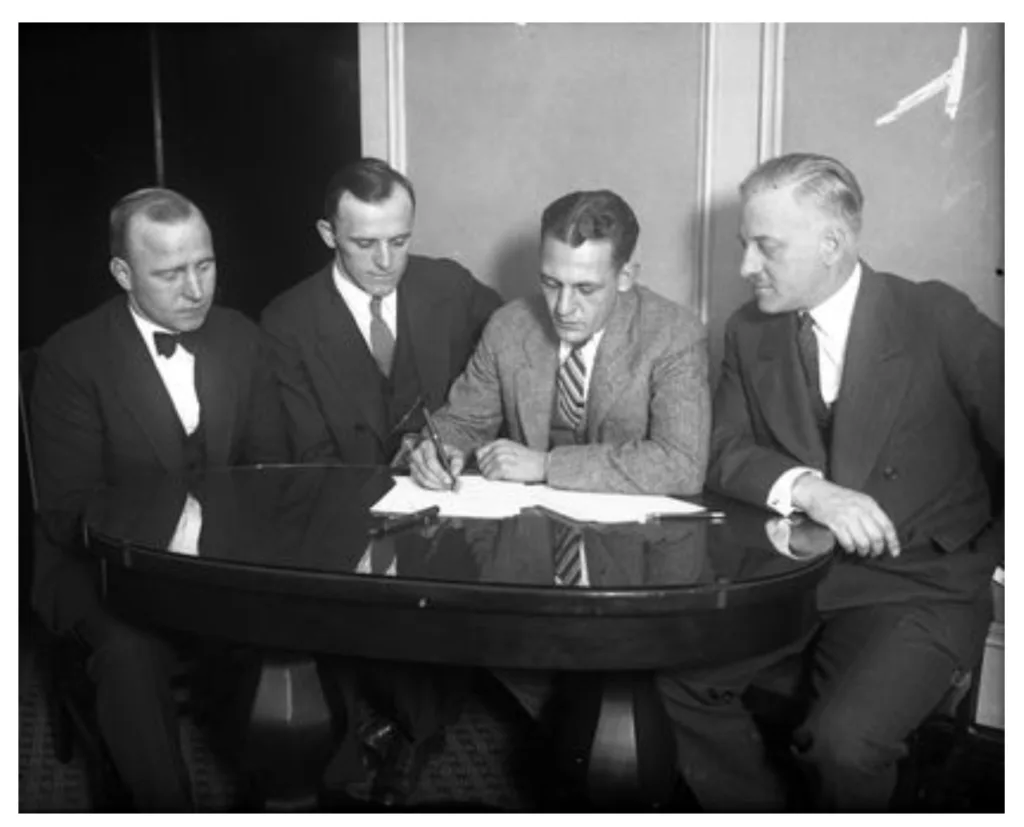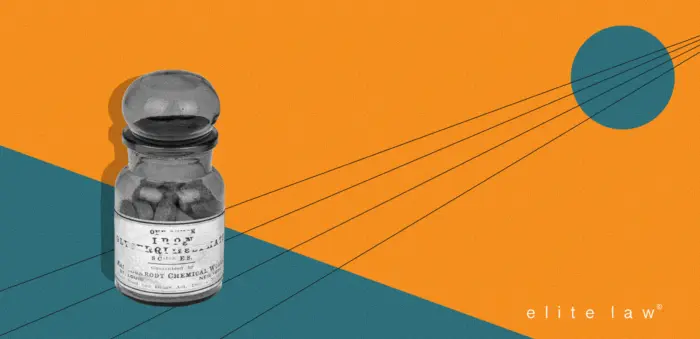Harold Edward ‘Red’ Grange is a name that may not tell you much.
He was an American football player whose sporting activities were concentrated in the 1920s and 1930s. He is remembered for being one of the greatest college football players of all time and for the two NFL titles he won with the Chicago Bears as a professional.
But Red Grange also has another record: he was the first professional player to have an agent. It was C.C. Pyle, a promoter and theatre owner, who was able to negotiate the player’s first professional contract with the Chicago Bears, extracting a salary of $3,000 per game, at a time when a player earned $100.
Not only that, Pyle was also able to negotiate a 19-game tour with the Bears to promote professional football, which was struggling to get out of the college circuit at the time, earning Grange more than $100,000. Pyle also assisted Grange in signing product endorsement deals and selling player-signed merchandise. Thanks to his work, Grange became the face of the newly formed National Football League and one of the richest football players in US history.
Since 1925, when Grange signed his first professional contract, the evolution of the figure of the sports agent has been enormous. More and more professional players, in more and more sports disciplines (from football to cycling, from baseball to basketball), have been assisted by agents in the management of their contracts.
Today, being an agent is a recognised and coveted (and sometimes criticised) profession, considered indispensable for the growth of an athlete’s career.
As we all know, it is the sportsmen and sportswomen who make the headlines and attract the attention of fans and spectators, but would they be the same without the work of their agents?
In today’s article, we will present the characteristics, and differences, of the agent regulations of three of the main sports worldwide with a major impact in terms of turnovers, i.e. football, basketball and cycling.
Becoming an agent
Starting with football, FIFA will most likely amend its regulations on agents as of October 2022. This article will therefore try to keep into account some of the future provisions which will enter into force as our team learned from the congresses we have recently participated to.
A common element for FIFA (football), FIBA (basketball) and UCI (cyclism) is that all these three international associations issue a licence to candidates passing an exam, paying a fee and after verification that such applicants have a clean criminal record to operate as an agent in the respective sector.
As to FIFA the exam-license approach will be applied again with the upcoming reform, being a return to the past and in particular to the years before 2015 when the so-called deregulation cancelled the necessity to hold a license to operate as intermediary in football.
Licenses in these three sports are granted at international level, are nominative and non-transferable.
It should be noted that these licences are provided to individuals and therefore a company cannot hold itself the capacity of being an agent in these sectors. Only the current FIFA rules allow it but this will change after the reform. Individuals are obviously authorised by all the three international federations to set up a company and operate and invoicing via such entity.
Another common point for all the sports and their international associations is the protected nature of athletes of minor age, albeit the regulations of UCI and FIBA on agents are not explicit. The new FIFA regulations on agents will allow the agents to approach minors and their legal guardians no more than six months before the minors reach the age where they may sign the first professional contract and get remunerated only when the minor is signing his/her first or subsequent professional contract. Besides, to represent minors or to be simply involved in a transaction regarding a minor the agent will be required to undertake specific regular courses.
Going into the peculiarities of each sport, at FIBA level the applicants must pay an annual fee up to CHF 1,000, pass a personal interview and a test to obtain and keep the license. The test is aimed at proving that the future licensed agent has adequate knowledge of the basketball regulations and appears capable and suitable of advising a player or club and to attend all seminars and learning courses as FIBA may require. It must be noted that lawyers are exempt to pass this test.
UCI is more rigorous as per the conditions to obtain its license. Alike FIBA, the applicant must have a clean criminal record and UCI further requires him/her to have knowledge of English and/or French as working languages.
The licensed agent must pay a registration fee which will be valid for 4 (four) years as of 1 January of the following date of issue. If a company is established, any employee working in such company run by the licensed agent can be assigned to administrative tasks only as the management of riders’ interests is exclusively reserved to licensed agents.
The licensed agents shall send their national association a regularly updated list of employees as well as an updated list of riders who are under contract. The applicants as well as licensed agents must pass a standardised UCI aptitude examination once per year and comply with the relevant national legislation, if needed.
Moreover, UCI requires the licensed agents to take out a professional civil liability insurance policy with an insurance company recognised by their national association of a minimum CHF 100’000. This must cover any complaint even made after the expiry of the policy but relating to an event that occurred during the period of the insurance coverage.
On the other side, while the current FIFA regulations do not require an international license to be obtained by the intermediaries, they however request them to abide by the regulations of the national association where they operate. As anticipated above, this will change with the new regulations, which will provide for a centralised licensing system organized by FIFA on a worldwide basis with exams to be conducted by multiple-choice tests prepared by FIFA and taking place in each member association. Similar to FIBA, the licensed agent will then be required to achieve a certain number of credits every year to demonstrate his/her continuing professional development in order to be able to maintain his/her license. The FIFA license will cost around CHF 600,00 per year. Any applicant will also have to meet certain eligibility criteria relating to the absence of criminal and/or disciplinary convictions and the incompatibility with some positions. It is interesting to note that the agents who can prove that they had a FIFA license as agents before 2015 will be exempted to repeat the exam and will be provided ex officio with the new license.
Still regarding football, it is of public knowledge that some national associations – such as in Italy and France – have very strict measures to obtain an agent license which derive from the national legislation in place. These associations are currently under discussions with FIFA to seek for an automatic recognition of their national system and license to have their holders to be equalised with the new holders of FIFA licenses.
The duration of representation contracts in each sport
All the federations put emphasis on the duration of the representation contracts, considering the short professional life of the athletes, in order to avoid an excessive link between them and the intermediaries.
UCI and FIBA limit the duration of the representation contracts up to a maximum of 2 (two) years without the possibility of agreeing on their tacit renewal, thus obliging the parties to agree and sign a new contract if they want to continue together.
While the UCI does not provide for any specific right for termination, under FIBA rules one party can terminate the representation contract by sending a 30 days’ notice.
On the other hand, although FIFA a priori does not seem to limit the duration of representation contracts in its regulations of 2015: it must be taken into account that it is for each member association to establish this limitation. As we will analyse in a separate blog post of the law firm in which we will compare the regulations for agents in four of the main associations, namely The FA (England and Wales), the RFEF (Spain), the FFF (France) and the FIGC (Italy), all of them have in common a limitation of 2 (two) years like in basketball and cyclism.
During the discussions related to the FIFA reform, the latter has proposed that the limitation of two years shall apply only when representing the players/coaches, thus the employees, while no limit be imposed when representing the clubs, being the employers.
The remuneration for agents in football, basketball and cyclism
Another important aspect that has always been at the centre of discussions is the remuneration that agents can charge for their services.
Whereas the 2015 edition of the FIFA regulations did not set a particular percentage of the value of employment contracts or transfer fees as mandatory threshold but suggested that it should not exceed 3% of the player’s gross basic salary or 3% of the transfer fee if representing a club in the transfer of a player, the new edition that is going to be issued seems much more stringent in this respect.
Agents representing the selling club in football will be able to agree a maximum of 10% (ten percent) of the transfer fee as remuneration but the transfer fee shall not include either any sell-on fee or any amount paid as compensation for breach of contract under article 17 FIFA RSTP.
However, when assisting players/coaches and/or their new clubs, the agent’s remuneration will be capped at 5% of their gross income (and 10% if representing both parties, player and club) composed of salaries and sign-on fees but not of contingent payments for the part of the remuneration below USD 200,000 and to 3% (6% if with dual representation) for the Player’s income overtaking such limit.
The following table illustrates the new FIFA’s system, if any change is not made during the following months:
| Agent’s client | Annual Remuneration below USD 200’000 | Annual Remuneration above USD 200’000 |
| Player/Coach | 5% remuneration | 3% remuneration |
| New Club | 5% remuneration | 3% remuneration on |
| Player/Coach & New Club | 10% remuneration (5% + 5%) | 6% remuneration (3% + 3%) |
| Selling Club | 10% of the transfer fee |
Besides, to reflect FIFA’s concern in this regard, payments to agents will have to be made through a clearing house managed by FIFA whereby the representation contracts signed between the parties will have to be uploaded onto the platform provided for that purpose.
Furthermore, in general the agent will have to be paid directly by the party who contracted him/her, meaning that the player will not be authorised anymore to ask his/her club to pay the agent on his/her behalf. This way of payment will still be accepted only in the case the player has a remuneration lower than USD 200,000 gross without any conditional payments.
As to potential conflict of interests, agents will be precluded to represent two or more parties in the same transaction with the exception of the new club and the player provided that a prior explicit written consent is given by both clients. In such case, the new club may pay up to 50% of the agent’s fees.
Another limitation that FIFA is considering to implement is on the overall remuneration: an agent shall not be entitled to receive any service fee not yet due deriving from a negotiated employment contract where the athlete transfers to another club before the negotiated employment contract expires; or the negotiated employment contract is prematurely terminated without just cause and the agent still represents the same athlete at the time of that termination.
Finally, any clause in a representation contract that limits the client’s ability to autonomously negotiate and conclude an employment contract without the involvement of the agent or penalises an athlete if they autonomously negotiate and/or conclude an employment contract without the involvement of the agent, will be null and void. On a parallel basis, a representation agreement may be terminated at any time by either party but the party revoking or terminating it without just cause must compensate the other party for any resulting damage.
With respect to the basketball system, FIBA allows that the remuneration be a maximum 10% (ten percent) of the value of the player contract without making any specific distinction between the fix and contingent payments and the possibility to include the value of the player’s benefits.
Agents licensed by FIBA must avoid any conflict of interests and therefore dual representation in the same transaction is strictly prohibited.
For the same reason, they cannot accept payments for their services by a third party and even represent or advise a club in any transaction if the agent is under contract with any player registered with that club.
As per cycling, the UCI does make a distinction on the basis of which type of remuneration is calculated. More specifically, the remuneration of the licensed agent is calculated in accordance with the fixed remuneration received by the rider by the end of the negotiated contract, without taking into account any supplementary services or other benefits. It can be paid in a lump sum fee at the start of the period of the contract between the licensed agent and the rider or by a payment divided in two instalments, each due at the start of the first and second half of the contract duration.
An important aspect that is explicitly stated in the UCI regulations is that when the licensed agent negotiates a contract with a team for a rider that is of a duration in excess of that of the contract between the licensed agent and the rider, the agent shall continue to receive the due remuneration until the expiry of the rider’s contract with the team.
In short, the duration of the representation contract is important for negotiating the contract between the rider and the team, but not essential for the payment of the remuneration, which will be due also later if derived from the contract the agent validly negotiated.
The responsibilities and duties of agents
In terms of responsibilities and duties, all three federations agree that an agent must be registered and cannot approach an athlete who is under contract with another agent (except, according to the new FIFA regulations, in the final two months of his representation agreement). The agents must respect the applicable national law, act professionally with their clients and with due diligence in their best interests.
The UCI regulations establish that an agent can only represent or manage the interests of a rider if there is a written standard contract, signed and previously registered with the national federation.
In this respect, any clause agreed by the parties in cyclism to supplement the standard contract but that goes against it and/or against the UCI statutes, regulations, directives and decisions and/or by which the rider’s rights are infringed, shall be deemed null and void.
In football, the competent bodies to sanction the licensed agents are the FIFA Disciplinary Committee and the Ethics Committee.
In case of violations of the above-mentioned duties in cyclism, the UCI Disciplinary Commission can impose to agents the following cumulatively sanctions: warning, fine from CHF 1’000 up to CHF 10’000, suspension of license, withdrawal of license and/or prohibition of exercising any activity related to cycling.
Interestingly, also the riders, teams and organisers can be punished by the UCI Disciplinary Commission if they contravene the regulations regarding the agents.
Concerning FIBA, the latter can impose any disciplinary sanction provided for in Book 1, Chapter 6, meaning the withdrawal of license, the decision of which will be made public. Alike UCI, players and clubs can be also sanctioned if they contravene the regulations regarding agents.
What if a dispute arises?
Finally, in the event of a dispute between the agent and his/her client, the athlete or the club/team, according to the current 2015 edition of FIFA regulations each national association would determine their own jurisdiction although the parties can also refer the dispute to TAS/CAS.
In the upcoming regulations, the new FIFA Football Tribunal Agents’ Chamber will have jurisdiction to hear dispute related to representation agreements having an international dimension.
The time-limit to file the claim will be the same as the other chambers of the Football Tribunal, i.e. 2 (two) years since the event giving rise to the dispute. As to the disputes without international dimension, the decision-making body of the relevant member association will be competent to adjudicate such disputes.
As per FIBA, any dispute must be referred to the FIBA Appeal’s Panel in accordance with the FIBA Internal Regulations governing Appeals (Book 1, Chapter 8).
Under UCI rules the competent body is the UCI Arbitration Board in accordance with the procedure established in Part XII of the UCI Regulations, Discipline and Procedures.
The importance of a signature
As we have seen in this post, the work of agents is now largely codified. Today it would be impossible for a mere theatrical contractor, without the necessary qualifications, to negotiate with a sports club on behalf of a professional sportsman, as happened to Red Grange with C.C. Pyle almost 100 years ago.
However, without C.C. Pyle’s insight and resourcefulness, things might have turned out differently; certainly for Grange’s career and for the history of the NFL, but perhaps also for the very evolution of the figure of the sports agent over the decades.



